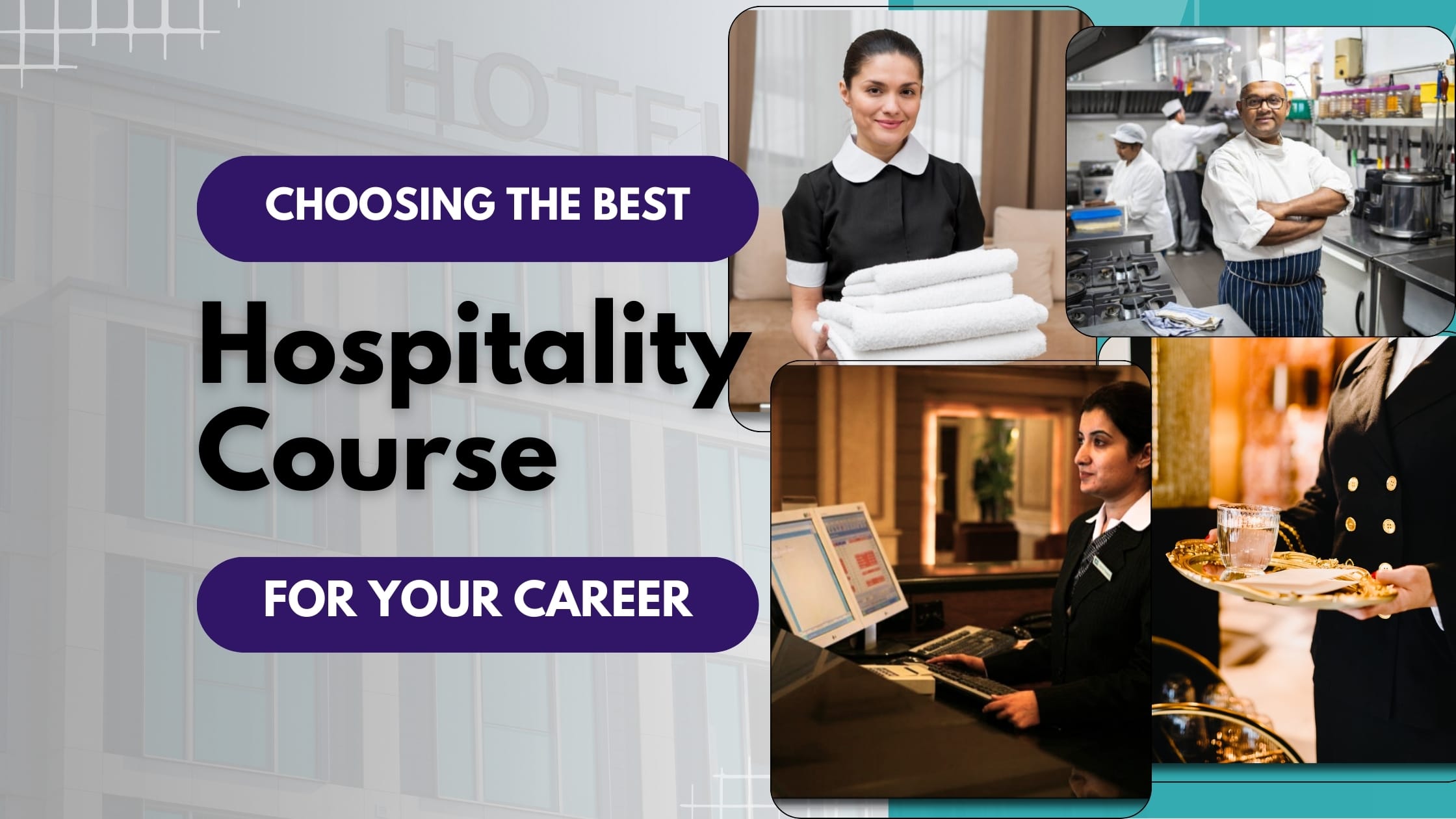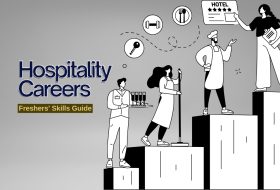The hospitality industry is a rapidly changing and ever-evolving career that spans a departmental range from hotel management, events, and tourism to restaurant operations. Career prospects for many today are encouraging for the establishment of hospitality management since global travel and tourism are on the rise. Choosing the right hospitality management course, however, is an important decision that will influence your success in the future. The guide below is a step-by-step consideration to aid you in course selection relative to what you want to be, thus giving you a basis for a justifiable career path.
Step 1: Define Your Career Goals
Take time to ponder your long-term career goals before jumping into the consideration of courses. The hospitality industry is broad, and your objectives will direct the kind of education you require. Will you be working your way toward running a luxury hotel, starting your restaurant, or managing significant events? Or are you inclined to consider sustainable tourism or operations within a cruise line? Each of these avenues requires particular skills and understanding.
So, if your goal is to become a general manager of a hotel, you need to know quite a few things about operations, finance, and customer service; however, if you specifically want to manage events, then logistics, marketing, and other creative courses might be more relevant. Note what your top three career choices are, as well as the skills you believe they need. This clarity will serve as your roadmap throughout the decision-making process.
Step 2: Research the Industry and Emerging Trends
There is worldwide influence with such prevailing trends as sustainability, technology integration, and demands from changing consumer preferences within the hospitality sector. Investigate a course selection that prepares you for the future. For example, there is a surge in demand for professionals in sustainable hospitality practices due to the increase in eco-conscious travellers. It also includes such advancements as the use of artificial intelligence in guest services or employing data analytics for revenue management in reshaping the field.
Industry reports may include those by WTTC, other journals of hospitality, etc., to identify the demand for skills. This denotes that the course you have chosen can teach you relevant future-proof skills rather than passable ones. A programme covering an aspect of digital tools or sustainability could be an added advantage here for employability.
Step 3: Identify Course Types and Levels
Hospitality management classes come in different formats in the form of certificates, diplomas, bachelor’s degree programs, and master’s programs that suit all stages of career development. Then again, if a beginner is the case, perhaps a diploma or undergraduate degree would serve as an entry point. Otherwise, for those already possessing experience or related degrees, a specialised master’s programme or a short certification could boost one’s career.
You need to assess your existing qualifications and available time. A normal bachelor’s degree would take three or four years, while a certificate could take, at the most, six months to a year. Online courses are not very time-consuming and are, therefore, beneficial to full-time employees, while in-person programmes would provide more hands-on training. Pick a mode of delivery and level of course to match personal circumstances and professional timeframes.
Step 4: Evaluate Course Content and Specialisations
Not all hospitality management courses created are the same. The syllabus should be checked if it is really on goal and covers some important subjects like operations, marketing, human resources, and, of course, financial management. A few of the programmes are specialised in tourist management, food and beverage management, etc., and luxury brand management; hence, it makes it possible to customise the study in terms of the chosen field.
For instance, if food and beverage appeal to you, a programme that strongly emphasises food and beverage is a fine option. In contrast, if you want to study international hospitality, select programmes that focus on the international arena and offer language or cross-cultural management courses. Have institutions send you syllabi or module descriptions so that you can see exactly what their content entails.
Step 5: Assess Accreditation and Reputation
Qualifications matter when you want to showcase your competency in a competitive field like hospitality. The course should, therefore, be taken in an accredited institution recognised by the authorities of education or industry, like the Accreditation Commission for Programs in Hospitality Administration (ACPHA). The quality standards in an accredited programme are maintained; hence, it has a valid position among employers.
Research the reputation of the institution. Based on ranking, successful alumni stories, and affiliations with hospitality brands, check it out. A university linked to major hotel chains or tourism boards might offer better networking and internship opportunities and help in improving career prospects.
Step 6: Consider Practical Experience Opportunities
It is a hands-on environment. This means theory is not enough. Good training deserves some practical aspects, like internships, simulations, or industry projects. These practical experiences can help apply classroom knowledge, build a professional network, and gain insight into the real world.
Find out about the programme’s placement record: Does it work with reputable hotels, restaurants, or event-orientated companies? Are the internships paid or unpaid and local or international? For example, a course providing a six-month internship at a five-star resort could offer valuable exposure and a foot in the door. Look toward the programmes bridging academia and industry.
Step 7: Analyse Faculty Expertise and Support Services
The quality of instructors considerably influences your overall learning experience. First, look for programmes taught by faculty with industry experience – not just during their academic tenure but preferably by former hotel managers, event planners, or tourism consultants who can add practical elements to academic theory. Again, make sure you review faculty profiles on the college’s website to gauge their credentials and expertise.
Besides lectures, consider the support services provided. Career counselling and resume workshops, job placement assistance would make the transition from learning to working much easier and perhaps smoother. Usually, vigorous student support manifests as a course that shows a university is concerned for the student’s success, even beyond graduation.
Step 8: Weigh Costs and Financial Options
It becomes important to compare the value of the course against your pocket because higher education usually requires an investment. Institutions have different tuition costs for different locations and depending on the course programme they offer. Additionally, one should also include accommodation costs, materials, and travel costs to and from home because most of these factors come into play when going to another country to study.
There are other options for students, such as scholarships, grants, or student loans. Many hospitality programmes offer scholarships that are based either purely on merit or need, and then some employers offer sponsorships for their employees to pursue higher education. Return on investment is done by researching along the lines of the average salary in that role, assuring that the benefits from the course would have justified its cost.
Step 9: Seek Feedback from Alumni and Professionals
Talk to people who have been through what you are going through before you finalise your decisions. Connect with the alumni through social channels or university networks, asking them whether the course was up to expectations or helped them find a job. Yet again, contact industry professionals to find out what qualifications employers value most for their employees. Their input may show strengths or flaws not seen in brochures. For example, an alumnus could tell of an excellent internship programme or limited career support that would affect your decision.
Step 10: Make an Educated Choice
After gathering all of the information necessary for comparison, review your favourite options in terms of the least restricted view, value, use, free-d positions, delivery, availability, use, effect, importer or exporter, or impact of cost or drawback. Make a pros-and-cons list for each course, weighing the curriculum, cost, reputation, and career alignment. Trust your instincts, but remember: this decision should be made based on evidence and how well this programme matches your very own goals.

Once you have made your decision, it is time that you apply for the programme for an early admission.
Diploma Course in Hotel and Hospitality Management
After making preparations for the long journey ahead, one can really say that choosing an appropriate degree in hospitality management is the first step towards a bright future – indeed, a bright future in an exciting, fulfilling, and viable career.
Choosing an excellent course on hospitality management is an exercise of self-evaluation, research, and deliberative thinking. These steps will provide you with a capable selection of a program that not only will allow you to realise your career dreams but also prepare you for success in this exciting arena: whether to manage a boutique hotel or reshape the future of tourism – the right education is the first step toward making your dreams come true.










